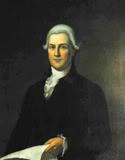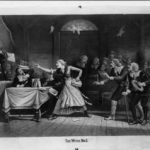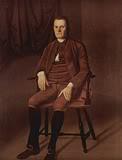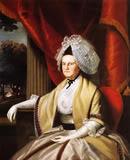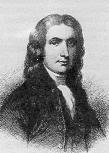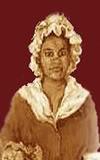Wife of Declaration Signer Samuel Huntington
Martha Devotion, oldest daughter of Reverend Ebenezer and Martha Lathrop Devotion, was born in 1740. Samuel Huntington was born on July 16, 1731, at Windham, Connecticut, the fourth of ten children. His father, Nathaniel Huntington, son of one of the founders of the town, settled along the banks of Merrick’s Brook near the center of Windham. There he and his wife Mehetabel raised their large family on a 400-acre farm and played an active role in the community.
Samuel Huntington
Nathaniel, as befitting his status as eldest son, was sent to Yale College, and became a Congregational minister in Ellington. Second son Samuel watched several of his brothers attend college, while he worked on the farm. He was much more inclined to studies, and would probably have been happier going to Yale himself. He began studying in his spare time with the encouragement of the Reverend Ebenezer Devotion, the family minister who lived nearby.
Samuel expanded his reading, studying law, perhaps using books borrowed from two Windham lawyers. On December 2, 1754, he was admitted to the bar in Windham, and by 1760 he had moved to the larger town of Norwich, where there was ample work for the young lawyer.
Martha Devotion married Samuel Huntington on April 17, 1761, and they settled in Norwich, where they had numerous influential relatives to help them along, including the Lathrops, Huntingtons and other prominent families. Samuel’s previous visits to the parson’s library probably also have served as visits to Reverend Devotion’s daughter Martha, since Samuel married her as soon as he had established himself with a home and steady income. She was twenty-two years old at the time of their marriage; he was thirty.
Few marriages have brought together two more congenial spirits. Blessed with no children of their own, they were the more a care and joy to each other. Their home was felt to be a home to all who had the good fortune to enjoy its hospitalities, and they frequently played host to a large circle of relatives and friends, made welcome with a cheer as bountiful as it was spontaneous.
Huntington built up an extended legal practice in Norwich, handling a variety of cases, and soon earned a solid reputation. He often represented the town in county court, and his practice increased to include several out-of-state clients, concerned with business in Connecticut. He began to take an active part in political affairs of the province. Politics was no novelty to Martha, because her father was ardently interested in the politics of Connecticut and represented Windham in the General Assembly from 1760 until 1771.
In a surprisingly short time, Norwich asked Samuel to represent them at the General Assembly. The same year, 1765, he was appointed by the General Assembly for the first of nine years as Justice of the Peace in Norwich, and also became a selectman. About the same time, he was appointed a King’s Attorney. Nine years later, Samuel’s conscience caused him to resign from this post and turn his back on what might have been a bright and comfortable future in the employment of the King.
Instead, Samuel Huntington became a patriot and dedicated his life to public service. In less than a decade, Samuel was receiving notice on a larger scale. The General Assembly appointed him an Assistant Judge of the Superior Court in 1773 and continued him in the position until 1784, when he was appointed to the Supreme Court of Errors. Although personal information about Huntington is limited, he was apparently ambitious but not arrogant. Well-connected, and with an ability to diplomatically get things done by persuasion or compromise, he gained the approval of freemen, as well as of the elite who governed the colony.
Although by nature diplomatic, Huntington shared the colony’s growing frustration with the taxes and restrictions coming from Parliament. A well-attended Norwich meeting in June 1774 chose a committee of nine men to draw up a resolution regarding “this Alarming Crisis of affairs Relative to the Natural Rights and Privileges of the People.” Samuel Huntington’s name came first on the list, and the resulting resolution pledged that Norwich inhabitants would defend the “Liberties and Immunities of British America,” and would cooperate with the other colonies in doing so.
On May 8, 1775, he moderated a meeting that instructed the Selectmen and Committee of Inspection to take care that no one “inimical to the Common Cause of America” be allowed to settle in town. Huntington was not a radical, but it is clear where his sentiments lay. Three days later, again representing Norwich at Hartford, he was elected to the Upper House of the General Assembly. Later in that session he was named to the Council of Safety, and in October was chosen as one of Connecticut’s delegates to the Continental Congress, to begin serving in January 1776. That year in Philadelphia, he would begin his national service, forming relationships with well-known delegates from other colonies.
By this time, Samuel was quite prosperous and had begun to accumulate real estate in Windham and Norwich. Samuel and Martha had no children of their own, but did not have an empty household. Martha’s sister Hannah had married Samuel’s brother, the Reverend Joseph Huntington. When Hannah died in 1771, two of their three children – Samuel and Fanny – came to live with the Huntingtons. Martha and Samuel raised and educated their niece and nephew as if they were their own.
The Huntington household had a reputation for youthful gatherings and plenty of music, and Samuel was apparently quite close to his extended family, which eventually included Martha’s young step-brother Mason Cogswell, after his mother died. When Samuel was asked to represent Connecticut at the Continental Congress, and then found it difficult to get back permanently to Connecticut, it was apparently distressing for him to be away from home for such a long time. He commented often on wishing he could go home.
With Oliver Wolcott, Samuel Huntington made a difficult journey of about two weeks in January 1776 to begin service in the Continental Congress. They arrived in Philadelphia on January 15, but Huntington was soon ill with smallpox, and was not able to carry on with his duties until late February.
In constant correspondence with individuals and the government back home, Connecticut’s delegates Huntington, Wolcott, and Roger Sherman received word of the General Assembly’s June vote, authorizing them to join the other colonies in declaring independence. Thus, diplomatic Samuel Huntington, who had never been prominent among the radical element agitating for breaking away from Britain, voted for and signed the Declaration of Independence.
![]()
Samuel Huntington Signature
On the Declaration of Independence
Aside from brief visits home in April and June, Huntington was in Philadelphia ten long months in 1776. Long days in Congress, a heavy load of committee assignments, dislike of the city, slow and inadequate reimbursement for his living expenses, and worry about family and business at home left him anxious to be done.
Arriving in Norwich in November, he immediately was caught up in the war effort at home as the Council of Safety and General Assembly grappled with the problems of provisions, prices, raising militia, and protecting the coast. Although again elected a delegate for 1777, there was work to be done in Connecticut, and Huntington stayed close to home. In July 1777, Huntington and other representatives of New England states and New York met to discuss economic problems brought on by the war, such as high prices, inflation, and unstable paper money.
In February 1778, Huntington headed back to Philadelphia with an appreciation of the effects of the war on the state level and in communities like Norwich. In his absence, Congress had written Articles of Confederation, but they were far from perfect, and states were slow to ratify. Huntington saw the need for some form of unified government and supported passage. After signing this new constitution, the Articles of Confederation, for Connecticut, Samuel headed for home in July on a leave of absence.
Again elected congressman in the fall of 1778, he reported to Philadelphia the next May. This session involved even more committee appointments and more visibility, especially on three major committees – the Marine Committee, a committee assigned to prepare instructions for negotiating a peace with Great Britain, and another to plan for one or more supreme courts of appeal.
On September 9, 1779, Huntington requested leave to again return to Connecticut, but before he could leave, he was elected President of the Continental Congress to replace John Jay, who had been appointed minister to Spain. By this time, Huntington had considerable experience and seniority, and was known to not let regional biases control his stand on national issues, making him an acceptable choice for competing regions. The presidency did not involve a great deal of prestige or direct power, but the quality of leadership could help determine whether factions could agree and business could be accomplished.
When it became apparent that he would need to stay in Philadelphia for the year of his presidency, after already having been away since May, Samuel sent for Martha, who arrived late in December. Like Samuel, she endured a bout of smallpox almost immediately upon arrival. Congress provided an expensive home, food and household supplies, and a staff. In spite of living more frugally than his predecessors, Huntington found the position a financial hardship. The presidency carried no additional salary, but he was expected to entertain other members of Congress and foreign dignitaries, while his own business interests in Connecticut were languishing. The Connecticut treasury forwarded him funds to help, but not enough to cover his expenses.
Huntington’s diplomatic skills were put to the test presiding over a sometimes contentious Congress. He spent long hours in correspondence with military and governmental officials in states and abroad, and in composing official documents. Although no longer expected to do committee work, he was still an active delegate from Connecticut, necessitating further correspondence with Governor Jonathan Trumbull and others. He dealt with absenteeism, irregular mail service, and constant worries about progress of the war and the economy.
Pressing the states to provide their quota of much-needed men and supplies was difficult without a means of enforcement or a stable currency. Huntington kept up correspondence with Benjamin Franklin, John Adams, John Jay, and others as they worked on diplomatic missions in Europe, and personally made friends with the French minister.
Although Huntington expected his term to expire in September 1780, Congress voted to keep him for another term. With the ratification vote of Maryland, the last hold-out state, the Articles of Confederation became the official constitution on March 1, 1781. The thirteen colonies became a nation, and some consider Samuel Huntington the first President of the United States.
In July 1781, Samuel resigned the Presidency and returned to Connecticut, hoping to stay. Business matters back home had been neglected too long, and his judgeship and seat on the Governor’s Council had been held open for him. His homecoming on July 25, 1781, was probably not as comforting as he had hoped.
On September 6, Norwich native Benedict Arnold and the British brought the war to southeastern Connecticut, attacking and burning nearby New London, then overwhelming Fort Griswold on the opposite shore of the river. Undoubtedly friends and acquaintances of the Huntington family were among those killed or affected, and Norwich was just upriver from the attacks. A month later, his mother Mehetable died.
Resuming his role in the General Assembly that fall, Huntington became active in committee work. Over the next two years, he drafted the first copyright law in America and prepared numerous reports. When re-elected to Congress in May 1782, he chose not to attend, leaving the representation to others, but when again designated a delegate in 1783, he relented and returned one more time to Congress, meeting this time at Princeton, New Jersey.
The war was over, although as yet unofficially, and Congress dealt with military pay problems, choosing a location for the capitol, and a variety of issues involved in the transition from wartime to establishing a new country. Huntington had served in Congress and as President during some of the most difficult years of the war, and he was again in Congress in October 1783 when word arrived that the Treaty of Paris had been signed.
In November 1783, Huntington finally returned home to stay. He was now a national figure, and in a position to act as liaison with other states and the national government on issues of mutual concern. Samuel was elected Lieutenant Governor in 1784 and 1785. He worked on rebuilding his law practice, and tutored students in law, including his namesake nephew.
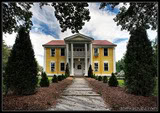
Samuel Huntington House
Norwich, Connecticut
The historian of Norwich wrote:
After the war, Samuel Huntington built a new house and lived in quiet dignity. A lively and happy circle of young people used frequently to assemble in this house, as visitors to the Governor’s adopted children, or attracted by the beautiful Betsey Devotion, Mrs. Huntington’s niece, and the belle of Windham, who spent much of her time here.
After the social chat and merry game of the parlor had taken their turn, they would frequently repair to the kitchen, and dance away till the oak floor shone under their feet, and the pewter quivered upon the dressers. These pastimes, however, had little in them of the nature of a ball; there were no expensive dresses, no collations, no late hours.
They seldom lasted beyond nine o’clock. According to the good old custom of Norwich, the ring of the bell at that hour broke up all meetings, dispersed all parties, put an end to all discussions, and sent all visitors quietly to their homes and their beds.
Mrs. Huntington was an affable but very plain lady. It is still remembered, that in a white short-gown and stiff petticoat, and clean muslin apron, with a nicely starched cap on her head, she would take her knitting and go out by two o’clock in the afternoon, to take tea unceremoniously with some respectable neighbor, the butcher’s or blacksmith’s wife perhaps. But this was in earlier days, before Mr. Huntington was President of Congress or Governor of Connecticut.
During the May 1786 session of the General Assembly, Samuel Huntington had again been elected Lieutenant Governor, and had already taken the oath of office, but no candidate for Governor won a majority of the vote. As a result, the General Assembly was free to select the Governor; they chose Samuel Huntington. He proved to be an extremely popular governor, winning each election until his death.
The Revolution and its aftermath had caused considerable financial stress in the state. Under Huntington’s leadership, the General Assembly addressed economic problems by giving strong encouragement to developing industries, especially textiles, through tax exemptions and other financial incentives.
In 1786 and 1788, Connecticut established procedures for handling claims by those injured in the Revolution. Land in the Western Reserve, held back when Connecticut surrendered title to most of the western lands claimed under the Charter of 1662, was used to help compensate those who had suffered loss of “homes or other property” to British actions during the war. A sale of the remainder of that reserve was used to establish a permanent school fund.
Huntington’s tenure as Governor saw the establishment of Connecticut’s first banks, incorporation of the Connecticut Medical Society, and state support of the struggling Yale College. Connecticut residents were barred from participating in the slave trade. The decision was made to erect “a large Convenient State House in the Town of Hartford to accommodate the General Assembly,” although the building was not dedicated until after Huntington’s death.
Samuel Huntington’s letters provide little comment on personal events and relationships, apart from the frequent assertion that he’d much rather be home in Connecticut, tending to personal business and spending time with his family. His health was also a cause for concern, and he frequently referred to the strain of his work in Congress.
William Strickland, an English visitor touring New England in 1794-5, visited Huntington in the company of Jeremiah Wadsworth. Strickland observed that Huntington was, “a respectable looking man grown gray in the service of his country, of strong sense in conversation, of a countenance sedate, thoughtful and benignant, and of plain unaffected manners.”
As Connecticut considered ratification of the U.S. Constitution in 1788, Huntington spoke to the convention about the document he had been working hard to promote in the state. He spoke of the need for representative government and the need for two branches of legislature “that the one may be a check upon the other.”
Connecticut’s representatives had played a great role in creating the compromise between large and small states that resulted in differing representation – according to population in the House of Representatives, an equal representation of states in the Senate – and the proposal to ratify passed by a large margin.
Martha Devotion Huntington died on June 4, 1794, in her fifty-sixth year. Samuel’s brother Joseph also died in 1794, and Samuel’s health began to decline during 1795.
Samuel Huntington died January 5, 1796, at Norwich, Connecticut, at the age of sixty-five, while still Governor of Connecticut.
Both Martha and Samuel Huntington were re-interred on November 24, 2003, at the Old Norwichtown Cemetery, where their remains rest side by side.
Samuel Huntington was well-known and respected in his day. He was awarded honorary degrees by Princeton, Dartmouth, and Yale, and counted among his acquaintances George Washington, Thomas Jefferson, and Benjamin Franklin, but his fame has subsided over the years.
A biographer of Samuel Huntington wrote:
He was a thoughtful man and talked but little – the expression of his mind and heart was put forth in his actions. He seemed to have a natural timidity, or modesty, which some mistook for the reserve of haughtiness; yet with those with whom he was familiar he was free and winning in his manner. As a devoted Christian and a true patriot he never swerved from his duty or looked back after he had placed his hand to the work.
SOURCES
About Samuel Huntington
Martha Devotion Huntington
Governor Samuel Huntington
Wikipedia: Samuel Huntington
Samuel Huntington 1731 – 1796
Samuel Huntington: Connecticut
Samuel Huntington: Governor of Connecticut
